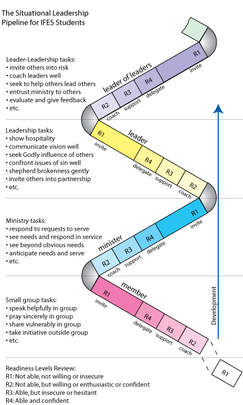So situational leadership, for example, helps us to choose a high relationship/high task oriented coaching strategy when people are in need of development on a particular task, and a low relationship/low task oriented delegation strategy when people are capable and know it.
Several members of the staff team here in Armenia acknowledged that their temperamental leadership preference is the "supportive" style, influencing with gentle encouragement and positive feedback. This is the ideal style when someone is newly capable at their (ministry or other) task, but is particularly unhelpful when people are not yet capable. According to the situational leadership model, when people are motivated but unable to consistently perform a particular task, they need coaching, not support, with both motivating encouragement and empowering and timely critique, enabling them to rapidly develop as they learn what they need to do to be more consistently successful in whatever task they are working on. We discussed the notion of coaches in sports teams, which do not simply offer words of encouragement but, through drills and practice, demonstrations and critical feedback, focus on skill development for the sake of the participants' ultimate success. I acknowledged my preferred style is the "Coaching" style, which is particularly unhelpful when the need is for support. When a developing leader is capable in an area, but lacking confidence, they need the supportive leadership posture from their staff, which builds their confidence, not the coaching posture, which focuses on areas of improvement and reinforces the message that they really are not capable. So natural coaches need to learn to take a supportive style when it is appropriate, and naturally supportive staff need to engage more directly in coaching when appropriate. When I first heard about Situational Leadership, I bristled with the notion that a "delegation" style, with its low relationship/low task focus, could be biblical. "We don't want to engage in student ministry so that we can eventually just sit at our desk in our offices reading email updates from our student leaders!" Of course, a review of the leadership posture of Jesus with his disciples at different times in his ministry convinced me that this is a very Biblical model. The goal of moving someone around the track, from invitation, to coaching, to supporting, and eventually to delegating, is not so that we remove ourselves from relationship with them, but that our development-focused relationship with them is able to be focused on higher developmental goals and tasks. So a good Bible study member is invited into ministry partnership in some way, which begins another turn in the developmental pipeline (pictured above). And, over time, that developed ministry team member is invited into small group leadership, requiring another turn in the development pipeline and a whole new round of coaching begins again. As we talked with the staff here, they stressed that students in the ministry here don't often show up as committed believers, so the levels of development look different, but they were glad to think about outlining the developmental pathways that they want their students to travel, and to grow in their own understanding of how best to help their students to do so. We have finished more than two weeks here in Armenia, with just a few days left and a few teaching and training opportunities with staff and students. We have really come to appreciate the staff here and their commitment and dedication to the students in the ministry. The ministry here has its challenges, from the lack of support it receives from the evangelical churches whose pastors are threatened by the parachurch approach, to the downright institutional pressure applied by the Armenian Apostolic Church on any ministry that would wish to do evangelism. But students are becoming believers, growing in their faith, taking risks and paying costs because they name the name of Jesus as their Lord. Join with us in praying for the student ministry here.
0 Comments
Leave a Reply. |
Archives
April 2024
AuthorRich and Lisa Lamb Categories |

 RSS Feed
RSS Feed